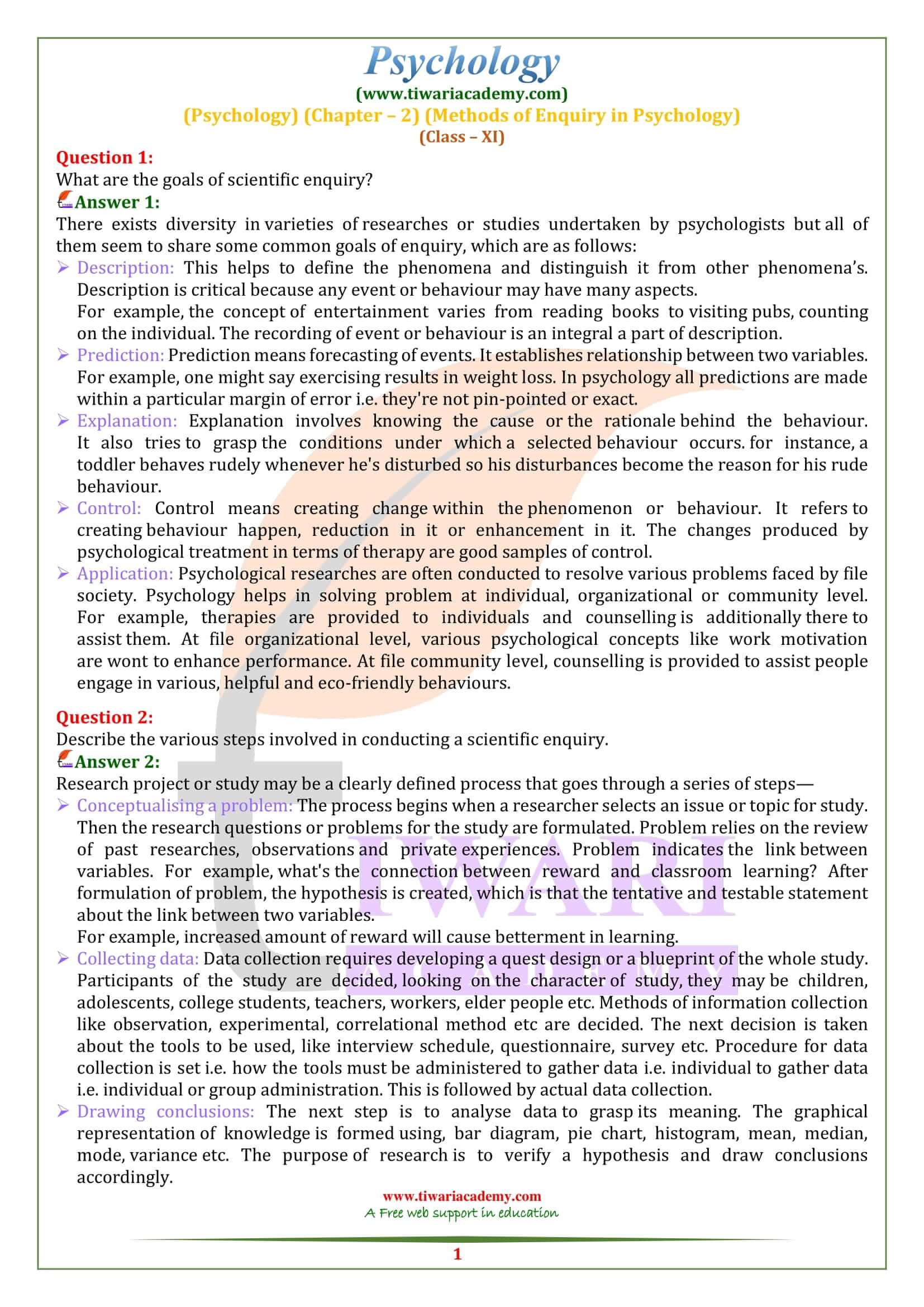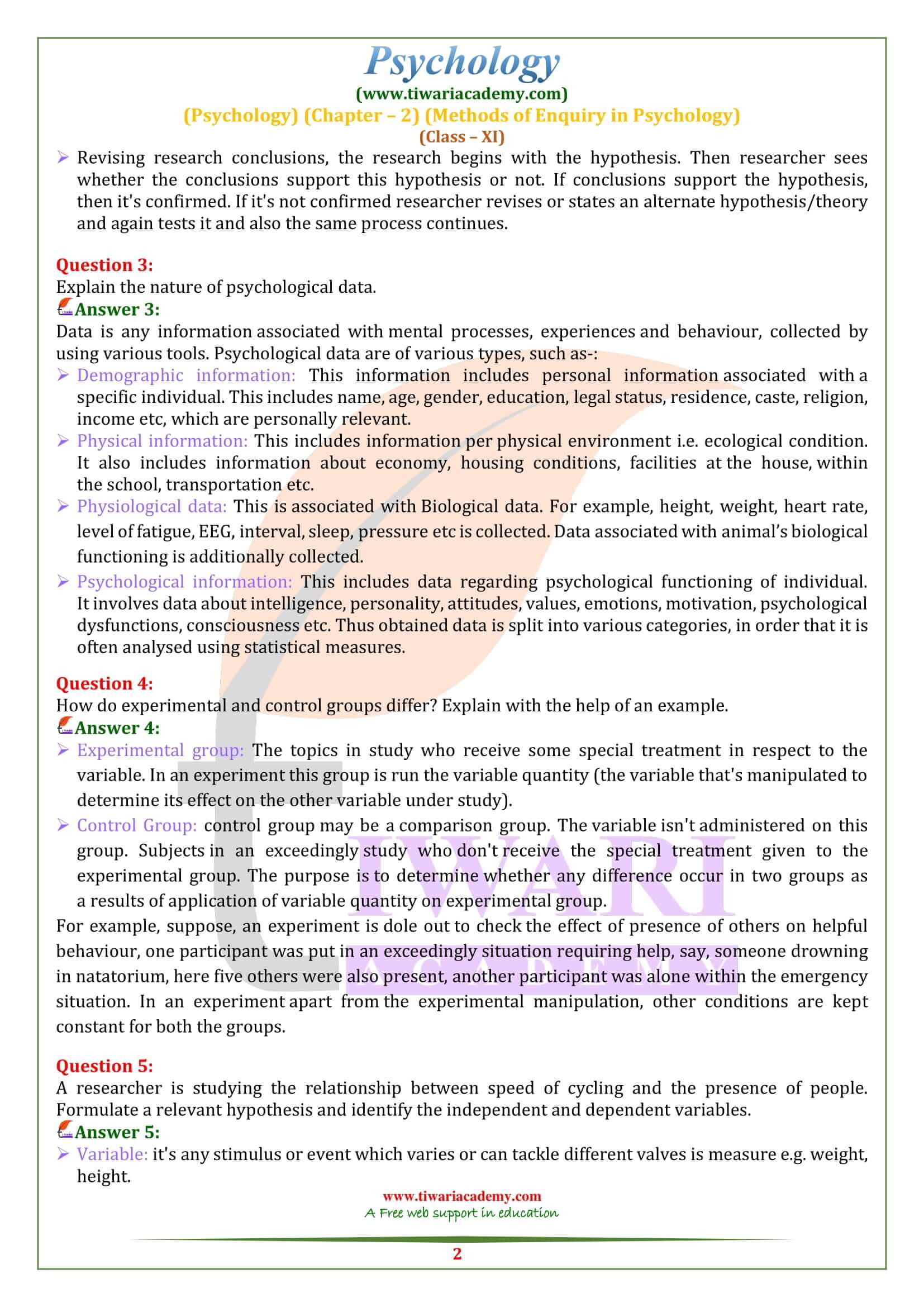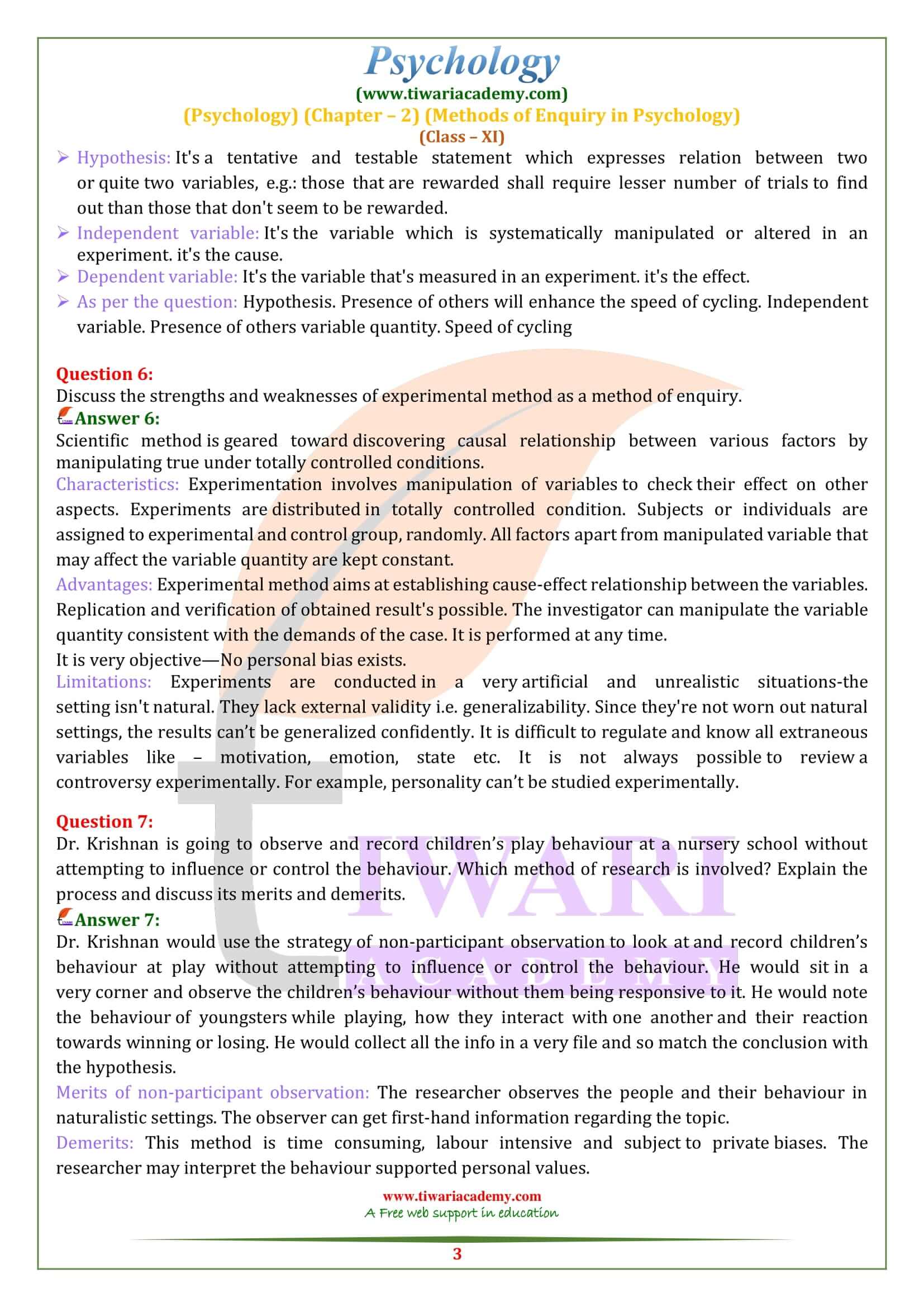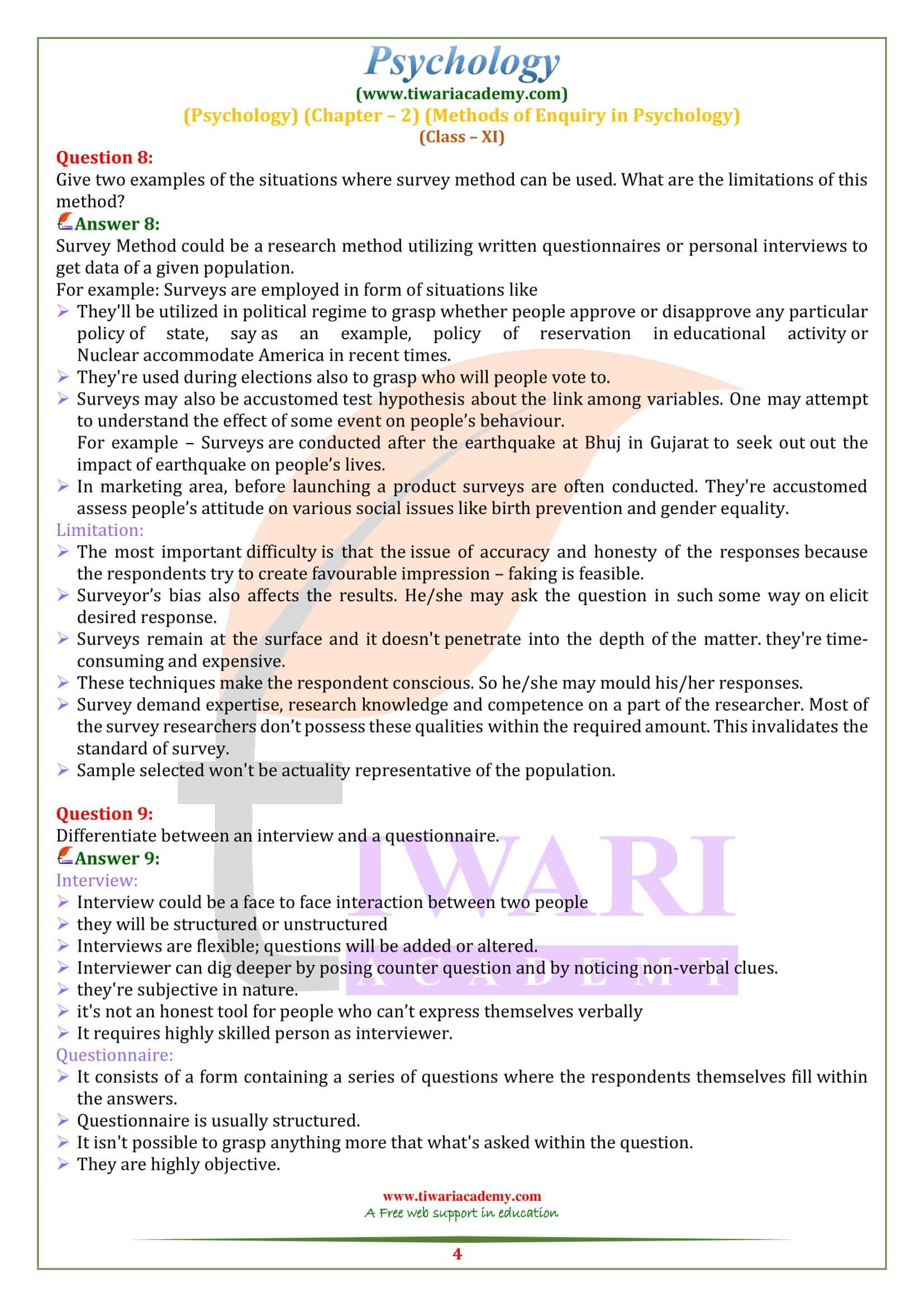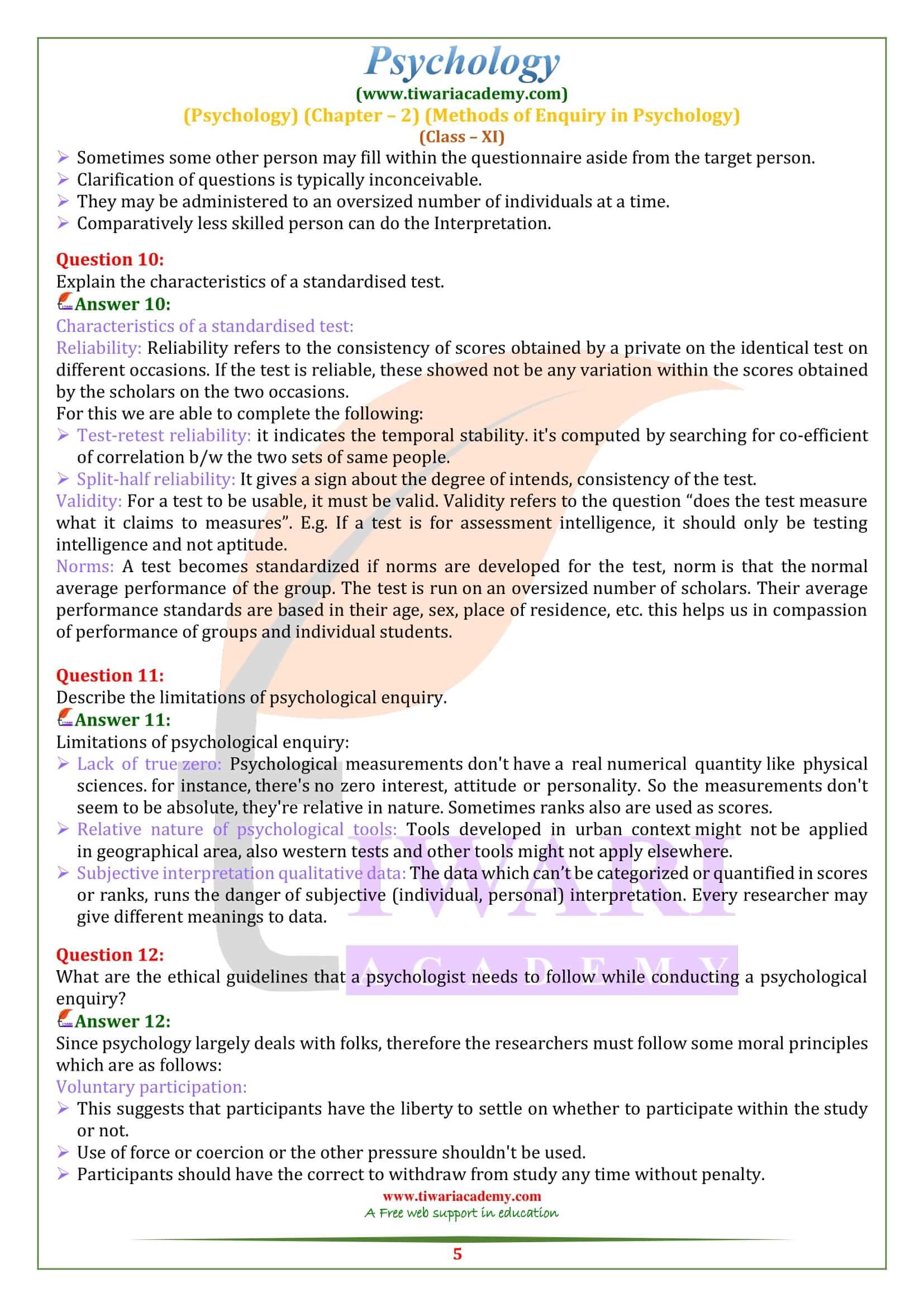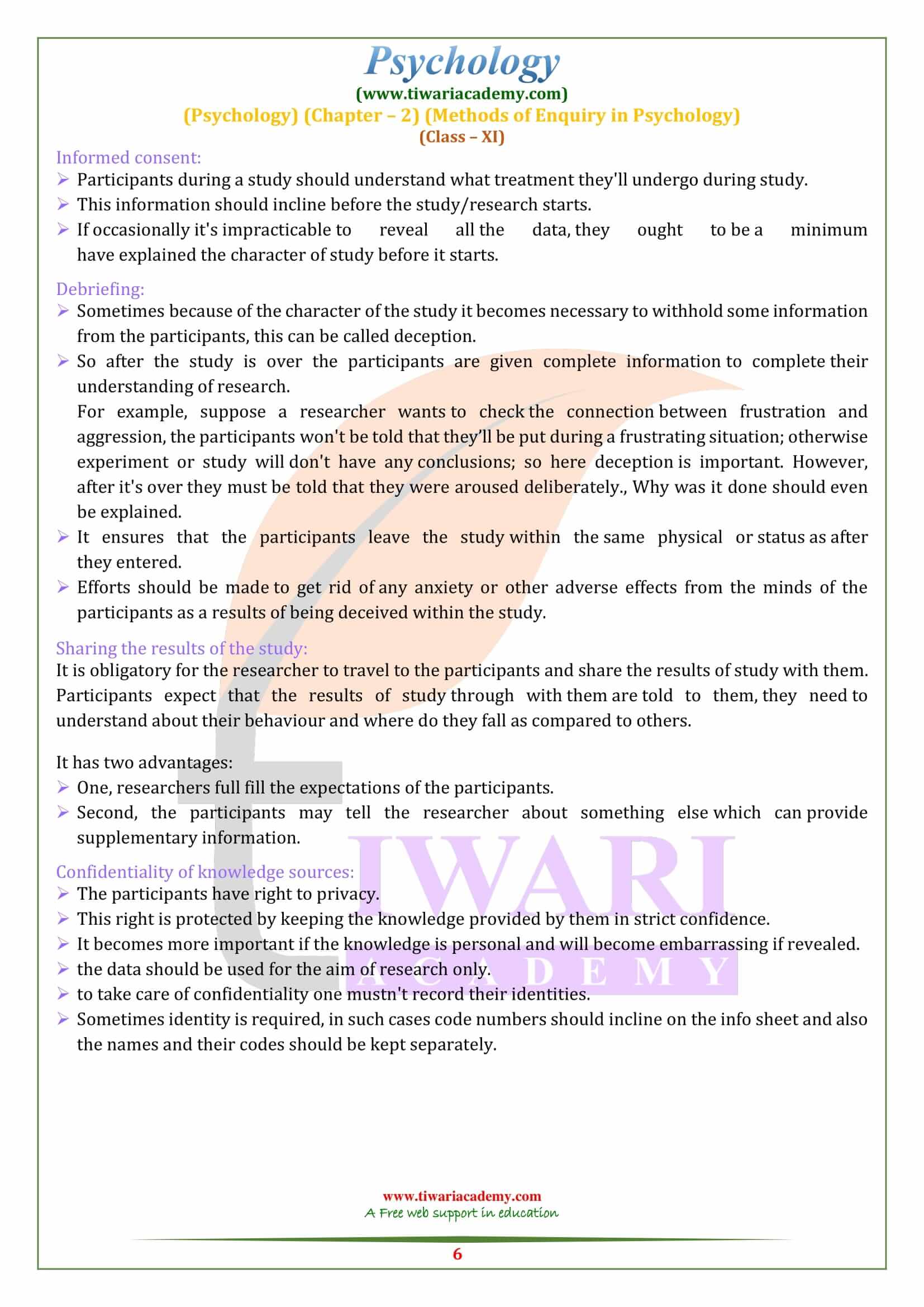NCERT Solutions for Class 11 Psychology Chapter 2 Methods of Enquiry in Psychology updated for session 2025-26 CBSE and State board students. Class 11 Psychology Chapter 2 Solutions includes important extra question answers and MCQ based on NCERT textbook.
NCERT Solutions for Class 11 Psychology Chapter 2
Class 11 Psychology Chapter 2 Methods of Enquiry in Psychology Question Answers
What are the goals of scientific enquiry?
There exists diversity in varieties of researches or studies undertaken by psychologists but all of them seem to share some common goals of enquiry, which are as follows:
Description:
This helps to define the phenomena and distinguish it from other phenomena’s. Description is critical because any event or behaviour may have many aspects.
For example, the concept of entertainment varies from reading books to visiting pubs, counting on the individual. The recording of event or behaviour is an integral a part of description.
Prediction:
Prediction means forecasting of events. It establishes relationship between two variables.
For example, one might say exercising results in weight loss. In psychology all predictions are made within a particular margin of error i.e. they’re not pin-pointed or exact.
Explanation:
Explanation involves knowing the cause or the rationale behind the behaviour.
It also tries to grasp the conditions under which a selected behaviour occurs. for instance, a toddler behaves rudely whenever he’s disturbed so his disturbances become the reason for his rude behaviour.
Control:
Control means creating change within the phenomenon or behaviour. It refers to creating behaviour happen, reduction in it or enhancement in it. The changes produced by psychological treatment in terms of therapy are good samples of control.
Application:
Psychological researches are often conducted to resolve various problems faced by file society. Psychology helps in solving problem at individual, organizational or community level.
For example, therapies are provided to individuals and counselling is additionally there to assist them. At file organizational level, various psychological concepts like work motivation are wont to enhance performance. At file community level, counselling is provided to assist people engage in various, helpful and eco-friendly behaviours.
Explain the nature of psychological data.
Data is any information associated with mental processes, experiences and behaviour, collected by using various tools. Psychological data are of various types, such as-:
Demographic information:
This information includes personal information associated with a specific individual. This includes name, age, gender, education, legal status, residence, caste, religion, income etc, which are personally relevant.
Physical information:
This includes information per physical environment i.e. ecological condition.
It also includes information about economy, housing conditions, facilities at the house, within the school, transportation etc.
Physiological data: This is associated with Biological data. For example, height, weight, heart rate, level of fatigue, EEG, interval, sleep, pressure etc is collected. Data associated with animal’s biological functioning is additionally collected.
Psychological information:
This includes data regarding psychological functioning of individual.
It involves data about intelligence, personality, attitudes, values, emotions, motivation, psychological dysfunctions, consciousness etc. Thus obtained data is split into various categories, in order that it is often analysed using statistical measures.
How do experimental and control groups differ? Explain with the help of an example.
Experimental group:
The topics in study who receive some special treatment in respect to the variable. In an experiment this group is run the variable quantity (the variable that’s manipulated to determine its effect on the other variable under study).
Control Group:
Control group may be a comparison group. The variable isn’t administered on this group. Subjects in an exceedingly study who don’t receive the special treatment given to the experimental group. The purpose is to determine whether any difference occur in two groups as a results of application of variable quantity on experimental group.
For example, suppose, an experiment is dole out to check the effect of presence of others on helpful behaviour, one participant was put in an exceedingly situation requiring help, say, someone drowning in natatorium, here five others were also present, another participant was alone within the emergency situation. In an experiment apart from the experimental manipulation, other conditions are kept constant for both the groups.
A researcher is studying the relationship between speed of cycling and the presence of people. Formulate a relevant hypothesis and identify the independent and dependent variables.
- Variable: it’s any stimulus or event which varies or can tackle different valves is measure e.g. weight, height.
- Hypothesis: It’s a tentative and testable statement which expresses relation between two or quite two variables, e.g.: those that are rewarded shall require lesser number of trials to find out than those that don’t seem to be rewarded.
- Independent variable: It’s the variable which is systematically manipulated or altered in an experiment. it’s the cause.
- Dependent variable: It’s the variable that’s measured in an experiment. it’s the effect.
- As per the question: Hypothesis. Presence of others will enhance the speed of cycling. Independent variable. Presence of others variable quantity. Speed of cycling
Give two examples of the situations where survey method can be used. What are the limitations of this method?
Survey Method could be a research method utilizing written questionnaires or personal interviews to get data of a given population.
For example: Surveys are employed in form of situations like
They’ll be utilized in political regime to grasp whether people approve or disapprove any particular policy of state, say as an example, policy of reservation in educational activity or Nuclear accommodate America in recent times.
They’re used during elections also to grasp who will people vote to.
Surveys may also be accustomed test hypothesis about the link among variables. One may attempt to understand the effect of some event on people’s behaviour.
For example – Surveys are conducted after the earthquake at Bhuj in Gujarat to seek out out the impact of earthquake on people’s lives.
In marketing area, before launching a product surveys are often conducted. They’re accustomed assess people’s attitude on various social issues like birth prevention and gender equality.
Limitation:
- The most important difficulty is that the issue of accuracy and honesty of the responses because the respondents try to create favourable impression – faking is feasible.
- Surveyor’s bias also affects the results. He/she may ask the question in such some way on elicit desired response.
- Surveys remain at the surface and it doesn’t penetrate into the depth of the matter. they’re time-consuming and expensive.
- These techniques make the respondent conscious. So he/she may mould his/her responses.
- Survey demand expertise, research knowledge and competence on a part of the researcher. Most of the survey researchers don’t possess these qualities within the required amount. This invalidates the standard of survey.
- Sample selected won’t be actuality representative of the population.
